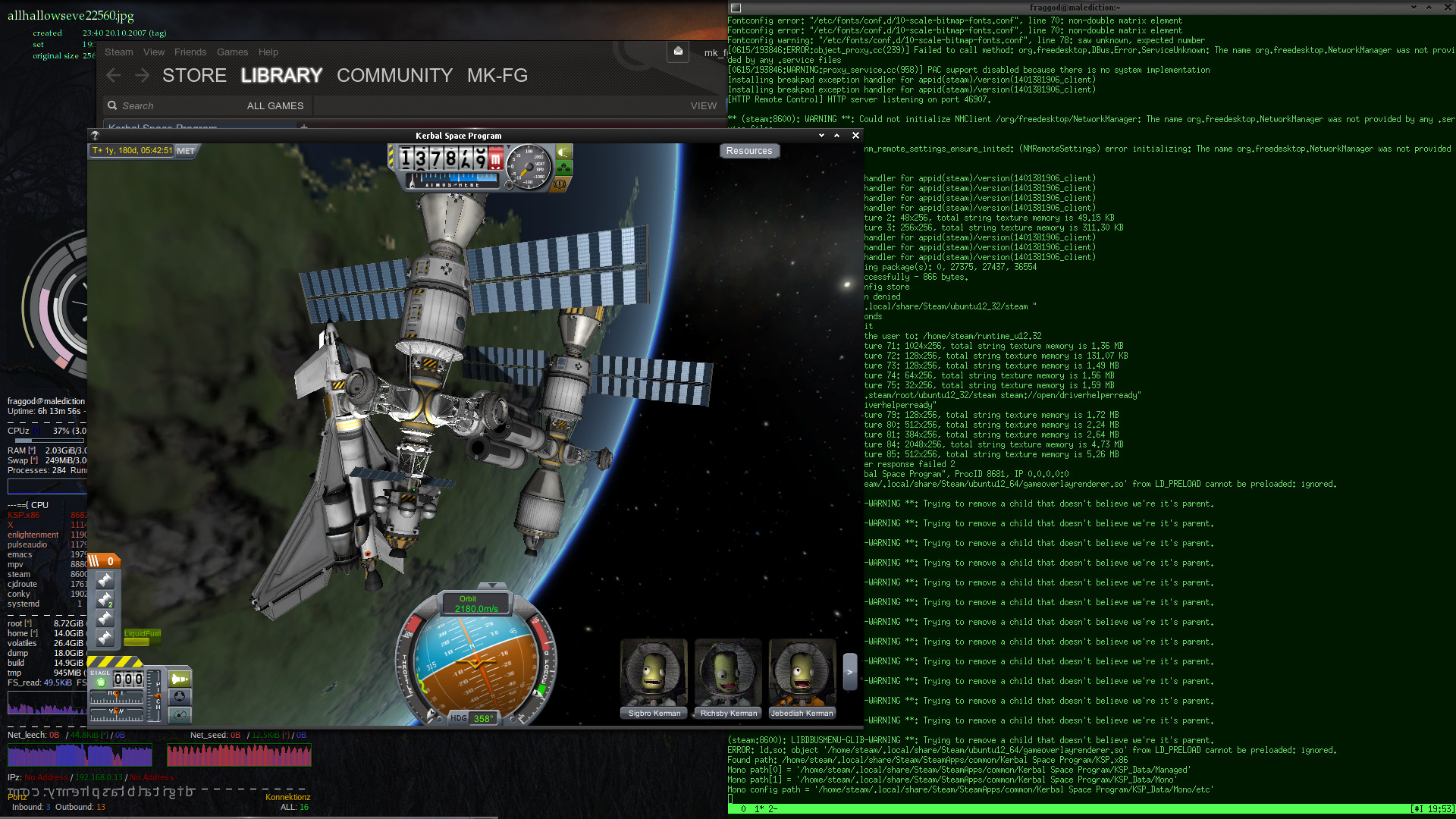Running isolated Steam instance with its own UID and session
Given that Steam is a closed-source proprietary DRM platform for mass software distribution, it seem to be either an ideal malware spread vector or just a recipie for disaster, so of course not keen on giving it any access in a non-dedicated os.
So, isolation:
To avoid having Steam and any games anywhere near $HOME, giving it separate UID is a good way to go.
That should also allow for it to run in a separate desktop session - i.e. have its own cgroup, to easily contain, control and set limits for games:
% loginctl user-status steam steam (1001) Since: Sun 2014-06-15 18:40:34 YEKT; 31s ago State: active Sessions: *7 Unit: user-1001.slice └─session-7.scope ├─7821 sshd: steam [priv] ├─7829 sshd: steam@notty ├─7830 -zsh ├─7831 bash /usr/bin/steam ├─7841 bash /home/steam/.local/share/Steam/steam.sh ├─7842 tee /tmp/dumps/steam_stdout.txt ├─7917 /home/steam/.local/share/Steam/ubuntu12_32/steam ├─7942 dbus-launch --autolaunch=e52019f6d7b9427697a152348e9f84ad ... └─7943 /usr/bin/dbus-daemon --fork --print-pid 5 ...
AppArmor should allow to further isolate processes from having any access beyond what's absolutely necessary for them to run, warn when these try to do strange things and allow to just restrict these from doing outright stupid things.
Given separate UID and cgroup, network access from all Steam apps can be easily controlled via e.g. iptables, to avoid Steam and games scanning and abusing other things in LAN, for example.
Creating steam user should be as simple as useradd steam, but then switching to that UID from within a running DE should still allow it to access same X server and start systemd session for it, plus not have any extra env, permissions, dbus access, fd's and such from the main session.
To allow access to X, xhost or ~/.Xauthority cookie can be used along with some extra env in e.g. ~/.zshrc:
export DISPLAY=':1.0'
In similar to ssh fashion, I've used pulseaudio network streaming to main DE sound daemon on localhost for sound (also in ~/.zshrc):
export PULSE_SERVER='{e52019f6d7b9427697a152348e9f84ad}tcp6:malediction:4713'
export PULSE_COOKIE="$HOME"/.pulse-cookie
(I have pulse network streaming setup anyway, for sharing sound from desktop to laptop - to e.g. play videos on a big screen there yet hear sound from laptop's headphones)
Running Steam will also start its own dbus session (maybe it's pulse client lib doing that, didn't check), but it doesn't seem to be used for anything, so there seem to be no need to share it with main DE.
That should allow to start Steam after ssh'ing to steam@localhost, but process can be made much easier (and more foolproof) with e.g. ~/bin/steam as:
#!/bin/bash
cmd=$1
shift
steam_wait_exit() {
for n in {0..10}; do
pgrep -U steam -x steam >/dev/null || return 0
sleep 0.1
done
return 1
}
case "$cmd" in
'')
ssh steam@localhost <<EOF
source .zshrc
exec steam "$@"
EOF
loginctl user-status steam ;;
s*) loginctl user-status steam ;;
k*)
steam_exited=
pgrep -U steam -x steam >/dev/null
[[ $? -ne 0 ]] && steam_exited=t
[[ -z "$steam_exited" ]] && {
ssh steam@localhost <<EOF
source .zshrc
exec steam -shutdown
EOF
steam_wait_exit
[[ $? -eq 0 ]] && steam_exited=t
}
sudo loginctl kill-user steam
[[ -z "$steam_exited" ]] && {
steam_wait_exit || sudo loginctl -s KILL kill-user steam
} ;;
*) echo >&2 "Usage: $(basename "$0") [ status | kill ]"
esac
Now just steam in the main DE will run the thing in its own $HOME.
For further convenience, there's steam status and steam kill to easily monitor or shutdown running Steam session from the terminal.
Note the complicated shutdown thing - Steam doesn't react to INT or TERM signals cleanly, passing these to the running games instead, and should be terminated via its own cli option (and the rest can then be killed-off too).
With this setup, iptables rules for outgoing connections can use user-slice cgroup match (in 3.14 at least) or -m owner --uid-owner steam matches for socket owner uid.
The only non-WAN things Steam connects to here are DNS servers and aforementioned pulseaudio socket on localhost, the rest can be safely firewalled.
Finally, running KSP there on Exherbo, I quickly discovered that sound libs and plugins - alsa and pulse - in ubuntu "runtime" steam bootstrap setups don't work well - either there's no sound or game fails to load at all.
Easy fix is to copy the runtime it uses (32-bit one for me) and cleanup alien stuff from there for what's already present in the system, i.e.:
% cp -R .steam/bin32/steam-runtime my-runtime
% find my-runtime -type f\
\( -path '*asound*' -o -path '*alsa*' -o -path '*pulse*' \) -delete
And then add something like this to ~steam/.zshrc:
steam() { STEAM_RUNTIME="$HOME"/my-runtime command steam "$@"; }
That should keep all of the know-working Ubuntu libs that steam bootsrap gets away from the rest of the system (where stuff like Mono just isn't needed, and others will cause trouble) while allowing to remove any of them from the runtime to use same thing in the system.
And yay - Kerbal Space Program seem to work here way faster than on Win7.
